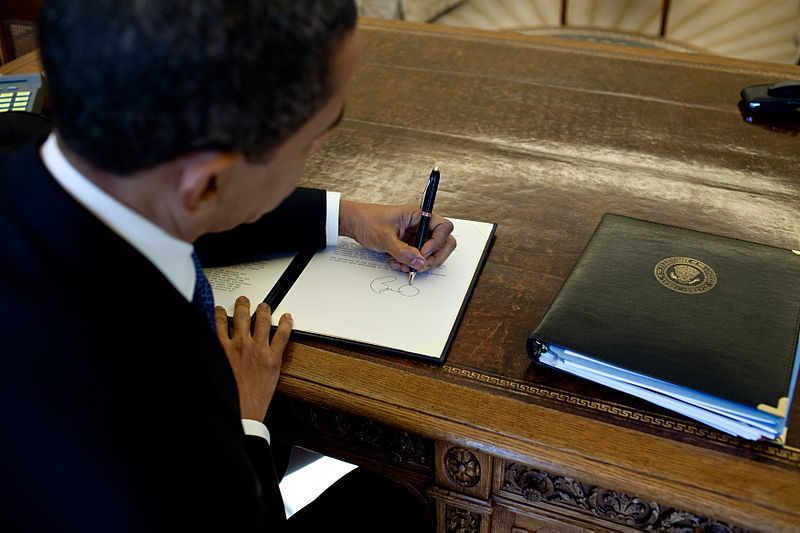
LGBT Executive Order regulations don’t clarify FBO rights
The federal Office of Information and Regulatory Affairs (OIRA) is now reviewing regulations proposed by the Department of Labor in response to President Obama’s July 21 Executive Order prohibiting sexual-orientation and gender-identity employment discrimination by federal contractors and their subcontractors and vendors. The draft final regulations–not a “proposed rule” with opportunity for public comment–apparently simply add to the employment nondiscrimination section of federal contract regulations the two new protected classes. But if that is all the regulations are, there will be no regulatory guidance on how the new prohibitions affect the religious-staffing exemption that is already in the regulations.
Recall: before the President issued his promised Executive Order to modify previous Executive Orders that apply to federal contracting, many leaders of faith-based organizations asked that a religious organization exemption be included, such as the exemption in the Employment Nondiscrimination Act bill adopted a year ago by the Senate (but not acted on by the House). With such an exemption, religious organizations would continue to be free under federal contracting rules to consider religion when hiring, and continue to be free to maintain a sexual conduct standard for employees. Without such an exemption, it is be less clear how the freedom to consider religion in employment decisions will be changed by the new requirement that federal contractors and their subcontractors and vendors not discriminate on the bases of sexual orientation and gender identity.
The Executive Order 13672 does not resolve the question: it did not include a new religious organization exemption, but also did not remove the existing religious staffing exemption. Well, then, if a religious organization that is a federal contractor, subcontractor, or vendor does not screen out potential new employees based on sexual orientation and yet maintains an employee conduct standard that restricts sexual activity to man-woman marriage, is it exercising its legal right to consider religion in its employment decisions or, instead, violating the new nondiscrimination requirements? (For an extensive discussion of the issues, see the series of posts for the Cornerstone blog.)
The Department of Labor’s Office of Federal Contract Compliance Programs was given 90 days to propose regulations to implement President Obama’s change of the federal contract rules. Rather than issue proposed regulations and solicit comment, it submitted final regulations–no commenting and no changes–for a technical review by OIRA, which considers items such as whether or not the regulations have a significant negative economic impact, require too much paperwork, etc. How is this possible? Since the draft final regulations only write in regulatory format the changes required by the Executive Order, there is nothing DOL can change and thus no reason to solicit comments-and therefore no clarification of the critical question.
Federal officials say that once OIRA approves the minimal regulations, the Department of Labor will specify that the changes will not come into effect for a further 120 days, and during that period will solicit questions and commentary from employers and others interested in the changes. Presumably, depending on the questions and the commentary, the Department and its federal contract compliance office might develop internal guidance to assist its officials, and write FAQs or other materials to guide faith-based organizations that need to know how the changes will affect their eligibility to participate in federal contracting.
IRFA is clear on items that the DOL should consider during that period:
- Federal officials are much more familiar with rules prohibiting employers from discriminating on various bases than with the freedom religious employers have to consider religion in employment decisions. In light of this, a significant training program ought to be developed for contract officials.
- When it comes to “ministerial” employees, the US Supreme Court has unanimously ruled that nondiscrimination prohibitions do not apply (Hosanna-Tabor v. EEOC, 2012). The Administration had argued the contrary position. Federal officials need specific training.
- Respecting court decisions, the DOL should develop guidance clarifying that the religious staffing freedom is a broad freedom: religious organizations that select employees based on religion and that, pursuant to those religious reasons, maintain an employee sexual conduct code, cannot be charged with sexual orientation or gender identity discrimination or be excluded from federal contracting.
- The DOL should provide training to contract officials on the application to federal contracting of the robust protections provided by the Religious Freedom Restoration Act.
- The DOL should develop a set of FAQs that make it clear to faith-based organizations and to federal officials that religious organizations can participate in federal contracting without giving up their consideration of religion in employment decisions and without abandoning their religiously based employee sexual conduct code.
